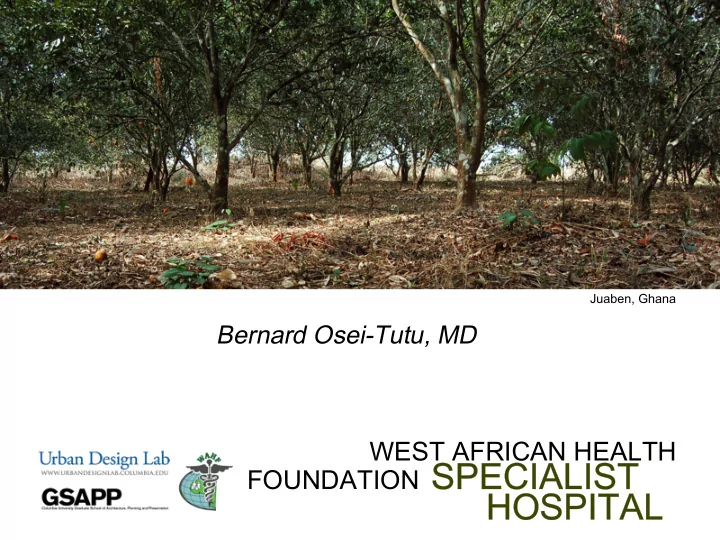

Juaben, Ghana Bernard Osei-Tutu, MD WEST AFRICAN HEALTH FOUNDATION SPECIALIST HOSPITAL
• The West African Health Foundation is a non-profit, non-governmental organization • Formed in New York in February 2001 • Initiated by a group of physicians who were concerned with the health status of individuals in the West African sub-region
WAHF Board Members
Mission of the West African Health Foundation ῆHealth and Wellness Education ῆMaternal and/ reproductive and child health ῆInfectious disease (Malaria, HIV/AIDS, Tuberculosis, Hepatitis ῆSexually transmitted disease ῆSanitation/ environmental health, personal hygiene ῆInjury prevention ῆTobacco/ alcohol/ substance abuse ῆImmunization ῆNutrition ῆPotable water ῆMedical Equipment / Surgical Supplies Donation ῆMalaria Control Program/ / Medical Missions
The Foundationṽs approach to the control of malaria involves raising awareness, community support, provision of healthcare and preventive tools.
Malaria Burden ῆ 350-500 million cases/ year globally ῆ 800,000 deaths/ year in Africa ῆ PREGNANT WOMEN AND CHILDREN ῆ Every 30 seconds an African child dies ῆ 3.2 million cases/ year in Ghana ῆ 38,000 deaths/ year ῆ 16,000 deaths/year in age 0-5 yrs ῆ 7,000 deaths/year in pregnant women ῆ $12 billion in economic loss WHO Africa: Dr. Sambo www.afro.who.int/ *Ghana Health Service Report April 2005
WAHF Malaria Control Program ῆ WAHF has distributed over 8,000 mosquito bed-nets in 11 rural villages over the last 6 years , at a cost of $80,000 ῆ WAHF activities also include: ῆ Donation of sanitation equipment and tools ῆ Comprehensive public health education ῆ Periodic indoor and outdoor insecticide spraying ῆ In Ghana, the use of mosquito bed-nets has proven to reduce child mortality by 18% and miscarriages by 33%
WAHF Malaria Prevention and Control Program
The health of a nation is dependent on several factors including the state of the economy , the number of people in gainful employmen t, educational leve l and the poverty rate of its nationals. West African Health Foundation
HEATH CARE INDICATORS - GHANA
Health Statistics GHANA vs. USA Ghana USA Life expectancy at M: 60.22 M: 76.05 birth (yrs), 2012 F: 62.73 F: 81.05 (www.cia.gov) Adult mortality 332 106 (per 1000), 2009 (WHO Country atasistics: www.who.int/whois) Under 5 mortality 69 8 (per 1000), 2009 (WHO Country atasistics: www.who.int/whois) Maternal mortality 350 24 (per 100,000 live births), 2008 www.cia.gov)
Health Care Indicators Continued GHANA vs USA Source: The World Bank 2009
Causes of Death, All Ages 2002 Source “WHO Ghana: Country Fact Sheet 2002
Causes of Death in Children <5 years (2008) Source “WHO Ghana: Health Statistics Profile 2010
Vision of the West African Health Foundation PROVIDE PROVIDE ESTABLISH CONDUCT ESTABLISH CONDUCT support, education support, education epidemiological and a Specialty Hospital epidemiological and a Specialty Hospital and faculty to clinics and faculty to clinics for the West African disease prevention for the West African disease prevention and rural and rural region research region research communities communities
West African Health Foundation Future Directions Establishing a Tertiary Medical Center of Excellence www.glumac.com www.daviehospital.org
A need for private healthcare in Ghana increased increased exponential limited demand for exponential limited demand for population government modern private population government modern private growth resources healthcare growth resources healthcare facilities facilities
WAHF envisions a Specialty Hospital that will provide: ῆTertiary care for the entire sub-region ῆPost-graduate training for the healthcare providers of the sub-region ῆTeleconference and Distance Learning Center Facilities to conduct forums, workshops, conferences and other educational programs ῆResearch facilities for epidemiology, disease prevention, medicinal plants and food/nutrition
Phasing of Hospital Phase 1 ῆ 50 Bed Hospital ῆ Multispecialty ῆ Ancillary services ῆ Ambulatory ῆ ICU ῆ Telemedicine Phase ῆ 100 Bed Hospital 2 ῆ Expansion of services in phase 1 ῆ Research Phase ῆ 250 Bed Hospital 3 ῆ Tertiary Care Center of Excellence with expansion of phase 1 and 2 ῆ Plant and herbal medicine center ῆ Patient guest facility ῆ Helipad ῆ Fitness center
In 2007, WAHF acquired a 10 acre plot of land from Nana Otuo Siriboe II for a specialty hospital project in Juaben
Columbia Universityᾼs Urban Design students and faculty visit to Juaben, 2013. The Urban Design students of Columbia University were asked to design the WAHF specialty hospital in rural Juaben, 30 minutes from Kumasi.
WEST AFRICAN HEALTH FOUNDATION HOSPITAL DESIGN
The UD Global Studio conceived a design strategy which questions the very definition of Ẇhospitalẇ in the 21st century. Richard Plunz, Director Urban Design Lab
Competitive Advantages of Kumasi
Advanced practices, WAHF Hospital R&D of herbal medicine Cultivation and sustainable harvesting Production and distribution of pharmaceutic als
The hospital will subsidize its low-income patients and provide funding for the upgrading of Juabenṽs health infrastructure
Hospitalṽs relationship to Juaben Upgrading Juaben Hospital Maternal & Child Care Skilled Doctors Specialised Training / R&D Sustainable Harvesting of Medicinal Plants Providing Jobs for Local Women and Men Usage and Dosage Codes/ Herbal Clinic
Holistic and passive design
View of private corridor
Hospital site plan Site Area ᾶ 10 Acres (4.03 ha) Total build-out area of the hospital ᾶ 9,000 square meters Total number of beds ᾶ 250 Phase 1 ᾶ 4000 sq.m ᾶ 50 beds ᾶ Estimated $6-10 million
View of hospital rooms
Main entrance of the hospital
Medicinal plant cultivation
WEST AFRICAN HEALTH FOUNDATION HOSPITAL FINANCING
Hospital Project Capital Cost Per Bed $120-200,000 per bed* Phase 1 (50 bed) $6-10 million 2 (100 bed) $12-20 million 3 (250 bed) $30-50 million * These are estimated costs based on FOCOS Hospital
Hospital Project Cost Components Component %of Capital Cost Land 5-10% Building 30-40% Medical equipment 30-40% Preoperative and 10-15% preliminary expenses Margin money (start up 10% expenses, cash, losses, others Contingency 5-10%
WEST AFRICAN HEALTH FOUNDATION THANK YOU
Acknowledgements WAHF members and supporters Juaben hospital, staff, and community Columbia University Urban Design Lab, The Earth Institute Columbia University Urban Design Program, GSAPP Millennium Cities Initiative, The Earth Institute Nana from Nana Otuo Siriboe II Juaben Traditional Council
Recommend
More recommend